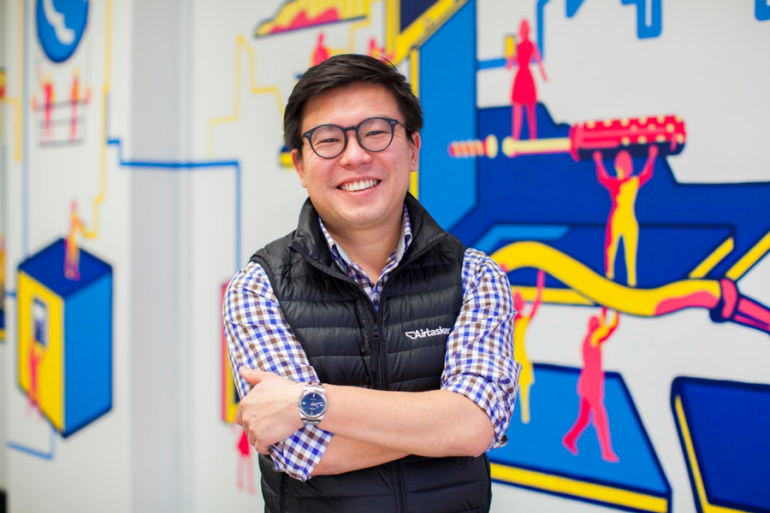This month Airtasker turns 10. It hasn’t been an ‘overnight success’.
Rather, one that has had so many ups, downs and ‘are we going to make it?’ moments. All of which have culminated in the community we have built today.
I’m writing this from a WeWork office in San Francisco – the first time I’ve travelled in two years.
And whilst it definitely feels like the world has morphed towards more hangouts, more Zooms and being more remote – it’s been really useful spending time ‘IRL’ here in the USA.
Just walking the streets and being present here has opened up my perspective.
There are ‘we’re hiring’ signs and ‘store closures’ everywhere. At our hotel, the manager on duty was doubling up as the housekeeper, the waiter and the bell person.
The labour shortage we’re experiencing seems to be everywhere.
The world is very different today than it was all those years ago when we first started to build the marketplace.
Here are a few of the lessons the experience has taught me:
1. Don’t overthink it
If you dwell on an idea and plan too much, you often convince yourself it’s a rubbish idea.
If I’d sat down at the beginning and planned the next 10 years, I probably wouldn’t have started in the first place.
2. Bring other people on the journey
Sharing equity didn’t phase me at all, and reflecting on Airtasker’s journey, I can say with certainty it was the right call.
I think a lot of founders want to hold onto equity so that they can keep control, but I think that leaders need to earn their influence. As a founder, you should be the one making calls because people trust you, not because you hold more power.
3. Sleeping is an action, not being lazy
Sometimes you might need to join a midnight meeting or reply to an important email, but don’t make it a habit.
Rather than being in front of your screen until 2AM, take a break, step back and do that work more efficiently when you’re rested and thinking straight.
As a general principle I think it’s super important to take breaks, draw boundaries and do things well.
4. Vulnerability is a secret power.
As leaders, I think it’s incredibly important to be vulnerable with your team and to acknowledge the moments where you don’t have all the answers.
When things are new or hard for me, I’ll acknowledge that from the outset — reiterating that while I might not have done this before, I’m still going to put in 100%.
I’ve found that showing that vulnerability helps in dissipating much of the unease (both my own and my team’s).
5. Be thankful.
Every now and again, it’s important to step back and look at the bigger picture and recognise what you’ve got to be thankful or grateful for — both from a work and personal perspective.
I think taking a little bit of time out to think about things like that eases stress, which can help you actually get some things done and prioritise.
6. Set boundaries for yourself
I have a boundary that even in the busiest periods, I’ll try to leave the office (ie. turn off Slack!) around 7pm.
We all have lives and loved ones that we need to prioritise — following through on this isn’t just important for leaders’ wellbeing, but for setting healthy expectations for teams.
7. Give yourself the morning
I try to avoid checking my emails as soon as I get up because I find that it’s overwhelming and affects your mood for the whole day.
I’ve learnt along my journey that for me, exercise in the morning is crucial to having a productive day.
8. Bringing great people together is one of the best parts
As we return to travelling and in real life experiences, we’re finding ways to encourage people to network in the office.
We have fully flexible working and that’s been a really positive thing for the culture in many ways. But we are trying to encourage people to come together from time-to-time.
So our Vibe team is creating incentives for people to come together and collaborate and chat together – things like free coffee and lunch.
I think it’s incredibly important to bring people together in the headquarters space.
9. Measure performance, not the time put in.
One of the most tragic and somewhat embarrassing mistakes I made In the early days was sending an all-staff email stating the working hours were from 9am to 6pm.
Of course, that didn’t resonate well and is one of the many ‘people’ mistakes I’ve made and learned from along the way.
We shifted completely and now measure how you’re performing, the impact that you’re creating and not how many hours you’re clocking in.
10. Try to catch people doing the right thing.
As a founder and a leader, I spend a lot of time thinking about what we could be doing better.
But I’ve learned that it’s also super important to stop along the way and call it out when you see people doing great work. When you see people doing the right thing – make sure everyone knows about it.
Don’t let it slide!




















Trending
Daily startup news and insights, delivered to your inbox.